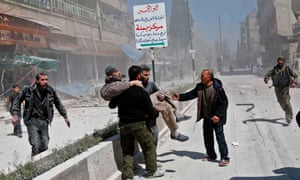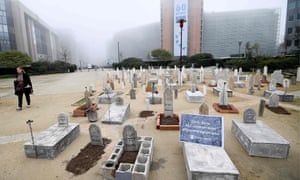
Raed Al Saleh:
'Today, European ministers meet in Brussels for a conference “to turn the page and start the political transition, the reconciliation process and the reconstruction of Syria”.
Yet only this morning we have witnessed a suspected chemical weapon attack – one of the most horrifying in six years of this bloody conflict. At least 60 civilians were gassed to death and more than 300 are still being treated; many are in a critical condition. Members of my team sought to wash the deadly chemical from the eyes of the affected children. Soon afterwards our centre in the town was destroyed, along with all of our life-saving equipment. Then a local hospital where victims were being treated was also bombed. On Sunday, the largest hospital in the region was also bombed, again after treating children affected by Assad’s chemical attacks. Are there no red lines?
No one wants to rebuild Syria more than the White Helmets do. When so much of our country has been turned into rubble, and almost half of our compatriots forced from their homes, of course we wish that the work to reestablish schools and hospitals and to build the peace in Syria could get underway. But how can it?
Yet only this morning we have witnessed a suspected chemical weapon attack – one of the most horrifying in six years of this bloody conflict. At least 60 civilians were gassed to death and more than 300 are still being treated; many are in a critical condition. Members of my team sought to wash the deadly chemical from the eyes of the affected children. Soon afterwards our centre in the town was destroyed, along with all of our life-saving equipment. Then a local hospital where victims were being treated was also bombed. On Sunday, the largest hospital in the region was also bombed, again after treating children affected by Assad’s chemical attacks. Are there no red lines?
No one wants to rebuild Syria more than the White Helmets do. When so much of our country has been turned into rubble, and almost half of our compatriots forced from their homes, of course we wish that the work to reestablish schools and hospitals and to build the peace in Syria could get underway. But how can it?
The central architects of the destruction, the Assad regime, continue their bombing campaign against Syrian civilians. As humanitarians and civil society groups, we are targets, and often victims. In the last few days our colleague Dr Ali Darwish was among those killed as he treated the victims of an illegal chemical weapons attack in his hospital in Hama, and Sameer Algohoosh, a volunteer with the White Helmets in east Ghouta, was killed by an airstrike. Doctors, like the volunteer rescue workers from the White Helmets, are called “terrorists” and singled out by the regime. Their families face reprisals from the regime for working in areas outside of their control. Systematic torture programmes and extrajudicial killings continue in the regime’s network of secret dungeons where tens of thousands of our countrymen, women and children still languish. Residential areas are still pummelled with barrel bombs, missile strikes and repeated chemical weapons attacks. How can anybody seriously talk about reconstruction in Syria while all this is happening?
The perpetrators of these war crimes and flagrant breaches of international humanitarian laws can never be credible partners in reconstruction. After all, these are the people who in all likelihood ordered the deliberate targeting of a UN aid convoy in October. The very same people who are currently blocking food and medical assistance from reaching more than a million of their own people, and who are criminalising our staff at the White Helmets for daring to treat the sick and wounded who live in non regime-controlled areas. The truth is that they should be facing prosecution, not the prospect of possible European taxpayer support.
The perpetrators of these war crimes and flagrant breaches of international humanitarian laws can never be credible partners in reconstruction. After all, these are the people who in all likelihood ordered the deliberate targeting of a UN aid convoy in October. The very same people who are currently blocking food and medical assistance from reaching more than a million of their own people, and who are criminalising our staff at the White Helmets for daring to treat the sick and wounded who live in non regime-controlled areas. The truth is that they should be facing prosecution, not the prospect of possible European taxpayer support.
I am therefore horrified at reports in the news, and from personal briefings I have received, that certain leading European politicians want to consider a deal with the Assad regime. It is beyond belief that the perpetrators of most of the violence could effectively be rewarded, and even propped up, for their crimes.
We – like other Syrian civil society and humanitarian leaders – will not have a voice at the Brussels conference, but if we were in the room we would tell European leaders they should not ignore Assad’s crimes, but instead stand up for basic principles of humanity.
Until an inclusive political transition is underway in Syria, until the bombs stop raining down on schools and hospitals, until independent monitors are allowed unhindered access to the regime’s detention centres, and the violence, sieges and forced displacement are ended, Europe should not countenance offering a single euro of reconstruction funding.'
We – like other Syrian civil society and humanitarian leaders – will not have a voice at the Brussels conference, but if we were in the room we would tell European leaders they should not ignore Assad’s crimes, but instead stand up for basic principles of humanity.
Until an inclusive political transition is underway in Syria, until the bombs stop raining down on schools and hospitals, until independent monitors are allowed unhindered access to the regime’s detention centres, and the violence, sieges and forced displacement are ended, Europe should not countenance offering a single euro of reconstruction funding.'

No comments:
Post a Comment